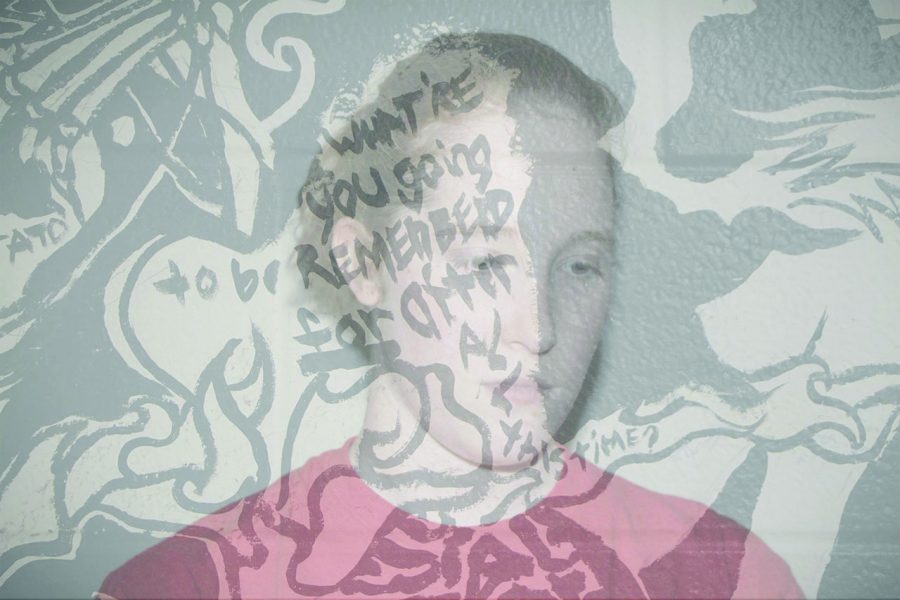Let’s talk terrors
Detailing fears of their own, students discuss their phobias.
Crowell said she fears being forgotten and fading into the background. To cope with this, she said she has developed strategies to combat her negative ideas. “When those thoughts come to my head, I think happy thoughts,” Crowell said.
April 27, 2020
How it works
Whether it be heights, butterflies, or the ocean, it is not uncommon that people tend to avoid a particular thing altogether. According to psychology teacher Tenny Dewey, a “phobia” is not particularly a “fear,” but rather a strong and reasonable fright that greatly affects one’s behavior.
Phobias are classified into three main categories. The first category is called “simple phobias.” Simple phobias are strong, reasonable fears that could be subjects like animals, locations, or heights, according to Dewey.
The next main type of phobia is called “social phobias,” or fears brought on by the presence of other people. Usually the subject who exhibits this fear appears apprehensive that they are being observed, evaluated or judged by others. Social phobia can also be classified as social anxiety, Dewey said.
“The number one reason students come to see me during the day is [to say] ‘I got some type of anxiety’. You know, it could be an anxiety disorder, or what’s now called social phobias,” Dewey said. The last type of phobia is called agoraphobia, Dewey said. Agoraphobia is defined as a fear of wide-open spaces or a fear of being put in situations where there is no escape.
To “treat” a phobia, there are two effective methods called flooding therapy and behavior therapy.
Behavior therapy systematically desensitizes a phobia. The steps in behavior therapy include telling the psychologist of the phobia and instructing them on relaxation techniques. Flooding therapy means being “flooded with fear,” Dewey said. An example of flooding therapy is direct exposure to the fear itself, like flying.
“Each individual takes their own approach,” Dewey said. “Some may go to the point where they seek professional help, others may just try and avoid the situation.”
Toilet Phobia
Having what is best referred to as “toilet anxiety,” junior Sidney Gana’s phobia, of using the toilet in public places, is so specific that there is not a designated name for her phobia. For Gana, she said she is particularly afraid of airplane toilets. She said she believes it is not a serious phobia, but it affects her usage of the bathroom on flights.
“Sometimes I hold my pee for two hours,” Gana said, “Which isn’t good for you.”
There is nothing particular from Gana’s childhood that she attributed to the development of this phobia of hers, but she said it might have stemmed from the usage of port-a-potties. Using a port- a-potty creates a sense of fear about accidentally dropping
her phone in and then it is gone forever, Gana said.
Despite the flare-ups of this phobia on planes, there is a positive of having this phobia, Gana said.
“I’m not the annoying person that will keep getting up from the window seat to go to the bathroom since I don’t want to,” Gana said.
However, when Gana does get on a flight, she knows what to do when she has to go to the bathroom, and how to prepare.
“When I am ready to flush, I have the door already unlocked and I am ready to open it,” Gana said.
Due to this fear of Gana’s, she said she uses her time before flights wisely by using the restroom and not drinking lots of water before boarding a flight.
Athazagoraphobia
Moderately affecting her life, senior Lindsey Crowell has the fear of “athazagoraphobia,” or the fear of forgetting or being forgotten.
Crowell developed this fear within her own family. A couple of months ago, Crowell’s grandfather passed away from Alzheimer’s, and witnessing him begin to forget everything and everyone around him, Crowell said, was terrifying to watch.
“It was getting to the point where he didn’t even remember who his wife was, who he was married to for 68 years,” Crowell said. “Just that thought of that possibly happening to me and me forgetting my family is terrifying.”
Although the passing of her grandfather caused Crowell’s moderate fear, she knows to appreciate the condition that she is in where she can still remember things, unlike her grandfather.
“I have just learned how much Alzheimer’s and forgetting impacts people; it’s really devastating,” Crowell said.
To treat this fear of Crowell’s, she says that whenever she begins to think about being forgotten, she switches over to thinking “happy thoughts,” and suggests that other people with fears do the same.
“Just do something to get your mind off of it, because you can’t necessarily get rid of it, but you can control it,” Crowell said.
Ophidiophobia
With the sight of snakes making her cry, junior Sadie Decker said she has the fear of snakes, also called “ophidiophobia.”
Before living in Kansas, Decker lived in Florida, which she said is snake infested. One particular traumatic time was when she said she found a large snake in her house in Florida, and from that point on, mothballs have to be kept around her house to keep snakes out.
Despite getting freaked out by the sight of a snake, Decker has learned to cope with her phobia, Decker said.
“I just think that you have to be cautious with things,” Decker said. “Because some snakes are good and some snakes are bad and they all freak me out.”
As a suggestion to others with a phobia, Decker advises one to not overthink about the fear, because doing so will cause you to freak out. She ultimately said one should worry about the things that are controllable, instead of wasting time overthinking about the fear itself.
Agoraphobia
Commonly known as agoraphobia, sophomore Rachel Stromberg possesses the fear of large, wide-open spaces with no escape. Stromberg’s fear used to be life-hindering when she was younger, but Stromberg has learned to handle her fear.
According to Stromberg, her fear came about when she was young and was playing with her siblings in a wide-open space with no trees. Stromberg said she looked up and was struck with fear by the emptiness of the land around her, and said she still experiences anxiety with her fear today.
“Sometimes, when I am out at monuments or tennis courts, I can’t look up because I just have to stare at either level with somebody or stare down at my feet,” Stromberg said.
Strongly disliking wide open spaces due to the inability to seek cover, Stromberg said in addition to this, she is also afraid of tall buildings.
“I’m afraid that gravity will reverse or something,” Stromberg said. “And I will float up in the sky.”
Stromberg said she suggests if one is struggling from a phobia like hers, to simply get help, because they will need it if it affects how they go about their daily life.







